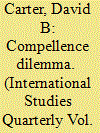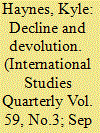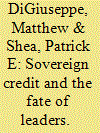|
|
|
Sort Order |
|
|
|
Items / Page
|
|
|
|
|
|
|
| Srl | Item |
| 1 |
ID:
141858


|
|
|
|
|
| Summary/Abstract |
This article analyzes the determinants of international child adoption. We argue that prospective parents' desire to reduce transaction costs and ensure a successfully completed adoption influences adoption flows. Drawing on dyadic panel data over the period 1991–2010, we fit hurdle models to identify sending-country and dyad characteristics that correlate with adoption flows. We show that an international agreement designed to ensure the integrity of adoption depresses foreign adoptions by raising transaction costs. By contrast, adoption is more likely when sending countries have a high-quality regulatory environment and when colonial or migration ties exist within the dyad. Our findings highlight the impact of transaction costs on transnational, non-market exchange, expand political economy models of migration, and emphasize the importance of private international law in international relations.
|
|
|
|
|
|
|
|
|
|
|
|
|
|
|
|
| 2 |
ID:
141856


|
|
|
|
|
| Summary/Abstract |
We assess how investors evaluate sovereign borrowers, arguing that sovereign risk is less “sovereign” than previous research assumes. Investors evaluate governments based not only on what they do, but also on investors' views of similar, “peer” countries. Professional investors use investment categorizations (geography, sovereign credit rating, or level of market development) as a heuristic device. As a result, peer country effects, as well as country-specific and global factors (booms, crises, or shocks), should explain sovereign interest rates. The peer effects we expect are regular features of international capital markets, rather than phenomena that occur in periods of market turmoil. We assess our expectations using error correction models of monthly sovereign risk premiums, which reveal significant interdependencies in sovereign risk assessments among countries, net of global and domestic predictors. Such contagion emerges principally in the short term, although we also find robust, long-term ties in sovereign risk assessments among countries sharing common regional classifications. Hence, our evidence suggests that professional investors' reliance on country categorizations facilitates the transmission of market sentiments—which include lower as well as higher risk premiums charged—across groups of countries, even when countries differ in key measures of creditworthiness. Our analyses highlight the importance of investors' ideas regarding country categorizations; they call into question the efficiency of sovereign debt markets.
|
|
|
|
|
|
|
|
|
|
|
|
|
|
|
|
| 3 |
ID:
141846


|
|
|
|
|
| Summary/Abstract |
This article introduces the idea of a compellence dilemma. This dilemma arises when the domestic policies of adversaries—such as hosting violent groups—threaten states’ security. Such states often consider coercive instruments to compel their adversary to change those policies. The problem? The prospect of costly punishment makes cooperation more attractive for the adversary. However, if they fail to coerce policy change, harsh punishments can reduce the adversary's capacity to enact policy change and induce harmful domestic instability. These problems are compounded by the fact that both the threatened states’ incentive to use costly punishments and the costs of failed compellence increase with the severity of the security threat. The logic of the compellence dilemma applies whenever a state uses damaging coercive instruments but risks failing to achieve its immediate objectives. I analyze the compellence dilemma with a dynamic game-theoretic model of interaction among a target state, host state, and violent group, and show that it is pervasive in equilibrium. I show that the compellence dilemma causes states to refrain from using harsh punishments even when they would compel the host state to cooperate. Concerns about decreasing future host-state capacity and increasing group power drive this result.
|
|
|
|
|
|
|
|
|
|
|
|
|
|
|
|
| 4 |
ID:
141848


|
|
|
|
|
| Summary/Abstract |
This paper offers a theory of military retrenchment by states in relative decline. I argue that a declining state will choose to withdraw foreign military deployments and security commitments when there exists a suitable regional “successor” to which it can devolve its current responsibilities. The degree of a successor's suitability and the strategic importance of the region to the declining state interact to determine when and how rapidly retrenchment will occur. Importantly, this devolutionary model of retrenchment predicts significant variations in retrenchment patterns across a declining state's multiple regional commitments. It advances the literature by producing nuanced predictions of precisely where, when, and how quickly retrenchment will occur. This paper assesses the theory empirically through an examination of Great Britain's varying regional retrenchment strategies prior to World War I.
|
|
|
|
|
|
|
|
|
|
|
|
|
|
|
|
| 5 |
ID:
141844


|
|
|
|
|
| Summary/Abstract |
International Relations theories generally hold that increased interaction between units in an international system produces convergence in their forms through military competition, institutional emulation, or normative socialization. In contrast, we argue that diverse international systems can endure despite increasing interaction. The early modern Indian Ocean international system hosted a variety of statist, corporate, and imperial polities. Diversity endured for three reasons. First, powerful foreign and local actors held differing maritime and land-oriented preferences for conquest, which created the potential for coexistence between unlike polities. Second, congruent European and Asian ideas of heteronomy facilitated durable polity diversity. Third, strategies of localization enhanced enmeshment. Convergence on common polity forms failed to occur despite the presence of a statist model during this period. Subsequently, a reconfigured form of diversity under colonial empires succeeded this order. Greater attention to past diverse systems coheres with recent calls to study history to better understand not only contemporary instances of international hierarchy, but also unbundled and shared sovereignty regimes.
|
|
|
|
|
|
|
|
|
|
|
|
|
|
|
|
| 6 |
ID:
141852


|
|
|
|
|
| Summary/Abstract |
How does the institutional design of a state's bureaucracy affect foreign policy? We argue that institutions can moderate bureaucrats’ incentives to act in accordance with an Executive's diplomatic preferences. Where the Executive can influence budgets or career paths, bureaucrats face incentives to adopt her diplomatic goals as their own. Where agencies are shielded from Executive influence, bureaucrats are free to act independently in a bid to enhance their autonomy and their reputation for competence. To test these expectations, we develop a new measure of bureaucratic independence for the 15 aid-giving agencies in the US government. We analyze how independence affects foreign aid allocation patterns over the 1999–2010 period. We find that in “dependent” agencies, foreign aid flows track the diplomatic objectives of the president. In “independent” agencies, aid flows appear less responsive to presidential priorities and more responsive to indicators of need in the recipient country. Our results highlight limits on the diplomatic use of foreign aid and emphasize the importance of domestic institutional design. Our findings yield insight into a broad range of policy domains—including international finance, immigration, and the application of economic sanctions—where multiple government agencies are in charge of implementing foreign policy.
|
|
|
|
|
|
|
|
|
|
|
|
|
|
|
|
| 7 |
ID:
141850


|
|
|
|
|
| Summary/Abstract |
Can the discovery of petroleum resources increase the risk of civil conflict even before their exploitation? We argue that it can, but only in poorer states where oil revenues threaten to alter the balance of power between regimes and their opponents, rendering bargains in the present obsolete in the future. We develop our claims via a game-theoretic model of bargaining between a government and a rebel group, where decisions over war and peace occur in the shadow of increasing oil wealth that both increases national wealth and shifts relative power in the government's favor. To test the model's main hypothesis, we leverage data on newly discovered oil deposits as an indicator of the state's expected future power resources. Our argument has important implications for the literature on credible commitments, power shifts, and violent conflict.
|
|
|
|
|
|
|
|
|
|
|
|
|
|
|
|
| 8 |
ID:
141851


|
|
|
|
|
| Summary/Abstract |
The United States often leads in the creation of treaties, but it sometimes never joins those treaties or does so only after considerable delay. This presents an interesting puzzle. Most international relations theory expects states to join treaties as long as the benefits outweigh the costs. Domestic theories modify this with the constraints of institutional veto players. Yet, sometimes neither of these arguments explains the delay or absence of US participation. We supplement these explanations with an opportunity cost theory. We argue that the advice and consent process sometimes slows or stalls because it imposes costs in terms of legislative time and political capital. These costs alter the calculus of key players and may obstruct the process. Statistical analysis supports the argument. The priority the Senate and President give to treaties depends not only on the value they assign to the treaty, but also on the value of the time needed to process the treaty. Presidents are less, not more, likely to transmit treaties to the Senate the more support they have in Congress. Furthermore, the more support the President has in Congress, the more the cost of Senate floor time matters for advice and consent.
|
|
|
|
|
|
|
|
|
|
|
|
|
|
|
|
| 9 |
ID:
141845


|
|
|
|
|
| Summary/Abstract |
The core claims of the practice turn in International Relations (IR) remain ambiguous. What promises does international practice theory hold for the field? How does the kind of theorizing it produces differ from existing perspectives? What kind of research agenda does it produce? This article addresses these questions. Drawing on the work of Andreas Reckwitz, we show that practice approaches entail a distinctive view on the drivers of social relations. Practice theories argue against individualistic-interest and norm-based actor models. They situate knowledge in practice rather than “mental frames” or “discourse.” Practice approaches focus on how groups perform their practical activities in world politics to renew and reproduce social order. They therefore overcome familiar dualisms—agents and structures, subjects and objects, and ideational and material—that plague IR theory. Practice theories are a heterogeneous family, but, as we argue, share a range of core commitments. Realizing the promise of the practice turn requires considering the full spectrum of its approaches. However, the field primarily draws on trajectories in international practice theory that emphasize reproduction and hierarchies. It should pay greater attention to practice approaches rooted in pragmatism and that emphasize contingency and change. We conclude with an outline of core challenges that the future agenda of international practice theory must tackle.
|
|
|
|
|
|
|
|
|
|
|
|
|
|
|
|
| 10 |
ID:
141841


|
|
|
|
|
| Summary/Abstract |
For several years now, China has implemented policies to promote the international use of its national currency, the Renminbi (RMB). As part of these efforts, the People's Bank of China (PBC) has negotiated 25 bilateral currency swap agreements (BSAs) with foreign central banks. These make it easier for firms in both China and its partner countries to settle cross-border trade and direct investment in RMB. We seek to explain why China and these countries cooperate via BSAs. We theorize that trade and direct investment interdependence relate to dyadic BSA cooperation via two mechanisms: financing insulation from international liquidity shocks and reduced transaction costs of cross-border exchange for local firms. Additionally, we expect the presence of preferential trade agreements (PTAs) and bilateral investment treaties (BITs) will increase the probability of dyadic BSA cooperation. BSAs are natural extensions of these existing agreements. They represent an additional layer of state-level formal cooperation that further reduces barriers to cross-border trade and direct investment. Our empirical analysis finds that both de facto trade interdependence and de jure economic integration via PTAs and BITs increase the probability of BSA cooperation between China and partners.
|
|
|
|
|
|
|
|
|
|
|
|
|
|
|
|
| 11 |
ID:
141855


|
|
|
|
|
| Summary/Abstract |
Do remittances stabilize autocracies? Remittances—money sent by foreign workers to individuals in their home country—differ from other sources of external non-tax revenue, such as foreign aid, because they accrue directly to individuals and thus raise the incomes of households. We argue that remittances increase the likelihood of democratic transition by undermining electoral support for autocratic incumbents in party-based regimes. Remittances therefore make voters less dependent on state transfers. As a result, autocracies that rely heavily on the broad-based distribution of spoils for their survival, namely party-based regimes, should prove especially vulnerable to increases in remittances. Evidence consistent with this argument suggests that remittances promote democratization in some dictatorships.
|
|
|
|
|
|
|
|
|
|
|
|
|
|
|
|
| 12 |
ID:
141842


|
|
|
|
|
| Summary/Abstract |
Analysts generally believe that a weaker currency primarily benefits a country's manufacturing and primary goods sectors. However, many of these industries—and the elected officials who represent them—frequently oppose legislation designed to combat the dollar's overvaluation relative to the Chinese yuan. I argue that legislators hesitate to take aggressive action on the exchange rate issue because doing so could lead to a disruption of the broader United States–China economic relationship. The threat of an economic conflict emerges as a particularly important consideration in the context of currency bills, where proposed legislation is linked to trade policy and other areas of international economic regulation. A Bayesian statistical analysis of legislative behavior on two recent exchange rate bills in the US Congress provides overall support for my hypotheses. Legislators with ties to business interests that rely heavily on the Chinese economy were more likely to oppose the bills, while the strongest support came from legislators representing import-competing domestic producers. The results highlight the ways that economic interdependence shapes bilateral exchange rate politics in particular, and United States–China interactions more generally.
|
|
|
|
|
|
|
|
|
|
|
|
|
|
|
|
| 13 |
ID:
141849


|
|
|
|
|
| Summary/Abstract |
The fighting in some civil wars primarily takes place in a few stable locations, while the fighting in others moves substantially. We posit that rebel groups that do not primarily fight for a specific ethnic group, that receive outside military assistance, or that have relatively weak fighting capacity tend to fight in inconsistent locations. We develop new measures of conflict zone movement to test our hypotheses, based on shifts in the conflict polygons derived from the new Georeferenced Event Dataset (GED) developed by the Uppsala Conflict Data Program (UCDP). Our empirical results provide support for the suggested mechanisms. We find that groups which lack strong ethnic ties and sufficient military strength to compete with government forces in conventional warfare fight in more varied locations. These findings improve our understandings of and expectations for variations in the humanitarian footprint of armed conflicts, the interdependencies between rebel groups and local populations, and the dilemmas faced by government counterinsurgency efforts.
|
|
|
|
|
|
|
|
|
|
|
|
|
|
|
|
| 14 |
ID:
141853


|
|
|
|
|
| Summary/Abstract |
In this article, we contend that the “democratic advantage” literature (i) exaggerates the potential political backlash from credit downgrades in democracies; and (ii) overlooks the importance of sovereign credit to nondemocratic leaders. We argue that nondemocratic regimes receive a higher marginal political benefit from credit compared to democratic regimes. Consequently, changes in credit prices or credit access affect nondemocratic leaders' tenure more than democratic leaders' tenure. To test this argument, we provide the first statistical examination of the electoral punishment mechanism of the “democratic advantage.” Our duration analysis shows that credit downgrades increase nondemocratic leaders' vulnerability more than that of their democratic peers. Our research reinforces the growing concerns about the conventional views about regime type, domestic constraints, and leaders' preferences toward sovereign credit and other political processes.
|
|
|
|
|
|
|
|
|
|
|
|
|
|
|
|
| 15 |
ID:
141847


|
|
|
|
|
| Summary/Abstract |
This paper argues that the effects of war as a performance issue in elections are different for a right-wing than a left-wing leader. War is consistent with the reputation of right-wing, hawkish governments, but does not fit the reputation of left-wing, dovish governments, and necessitates a turn away from the domestic issues the public expects left-wing governments to prioritize. War therefore varies in its effects on perceptions of right-wing and left-wing leaders. War also provides more temptation for left-wing supporters to defect to the incumbent under a right-wing government than for right-wing supporters to defect under a left-wing government. The War in Iraq and elections in the United States and UK provide a unique case to test these arguments. The results confirm that Blair paid a higher political price as a left-wing leader, because perceptions of Blair's trustworthiness became central to evaluations of him. Conversely, positive perceptions of strength became central to evaluations of Bush as a right-wing leader. The war also had asymmetric effects on supporters of the opposition party in the UK that resulted in higher costs to Blair. These findings imply that the risks of going to war are greater for left-wing leaders.
|
|
|
|
|
|
|
|
|
|
|
|
|
|
|
|
| 16 |
ID:
141857


|
|
|
|
|
| Summary/Abstract |
Existing literature on international migration suggests that partisan differences exist in regards to policies that regulate the conditions of migrants residing in host countries (migrant policies), but not in regards to policies determining the admission of new migrants (migration policies). We propose that partisan differences exist regarding migration policies, but that these differences are conditional on a party–labor relationship. In our empirical analysis, we use error correction models to examine asylum and labor migration policies in Western European countries from 1984 to 2006. We find that migration policies become more liberal as government partisanship moves to the left only when unskilled manual workers split their votes between left-wing and right-wing parties. The result implies that a strong relationship between left-wing parties and workers, which mutually benefits both groups in some areas (such as welfare), may be incompatible when conflicts arise between their interests concerning issues such as international migration.
|
|
|
|
|
|
|
|
|
|
|
|
|
|
|
|
|
|
|
|
|